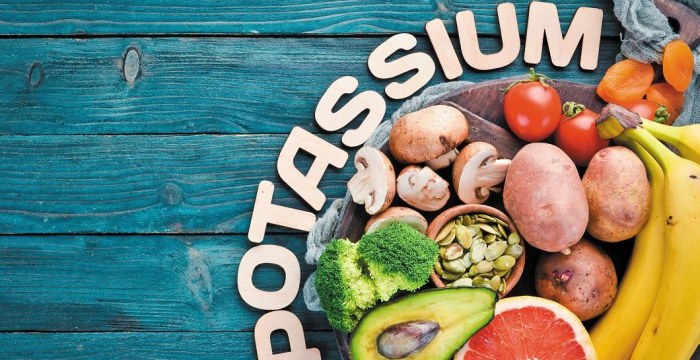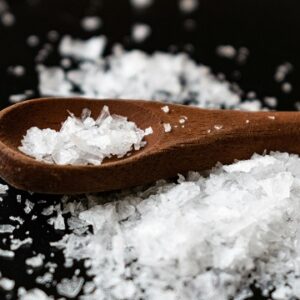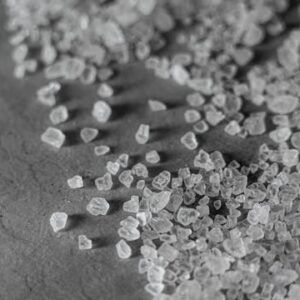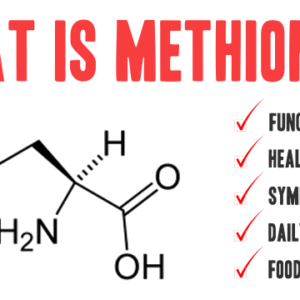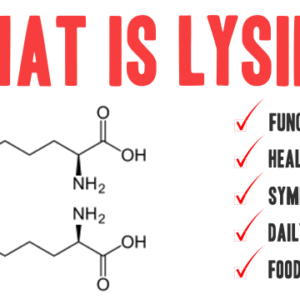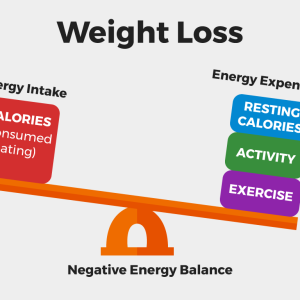Potassium is one of the vital essential minerals found in most foods. It helps the body to work properly, especially heart, muscle and bone health. It’s the kidneys’ job to keep potassium in balance. Its excess or deficiency can be dangerous, even fatal. The diuretics, laxatives and other underlying conditions used are the main causes of imbalances in the amount of potassium. Bananas, plums, avocados, potatoes, tomatoes, carrots, spinach and cauliflower are foods rich in potassium.
What is potassium?
It is one of the electrolyte minerals that helps cells work properly. Electrolytes are electrically charged minerals that help control muscle-nerve activity in the body, maintain fluid levels, and perform other important functions. The body usually gets the potassium it needs from natural foods. The normal reference range for potassium in adults is 3.5-5.0 mmol/L.
What Does Potassium Do in Your Body?
- It balances the harmful effects of sodium on blood pressure.
- It plays an important role in activating nerve impulses that help regulate muscle contractions, heartbeat, reflexes and many other processes.
- It can provide fluid balance.
- It helps to transport nutrients into cells and remove waste products out of cells.
- It maintains the pH (acid-alkalinity) balance.
Benefits of potassium
- cardiovascular diseases
- Hypertension
- Stroke
- Dehydration (fluid loss shock)
- Kidney stones
- Osteoporosis (bone loss)
- Edema
- It can prevent the development of cellulite.
Potassium and hypertension
Hypertension (high blood pressure) is an important risk factor for heart disease and stroke. People with low potassium intake are more likely to develop hypertension, especially if they consume large amounts of salt (sodium). Eating a diet rich in potassium and reducing salt can help lower blood pressure. The more potassium ingested, the more sodium is lost in the urine. It also stabilizes blood pressure by helping to relieve tension on blood vessel walls.
Potassium and heart health
Potassium deficiency can impair the functioning of the heart, and too much can be fatal. Abnormal heart rhythms (arrhythmias) are the most worrisome complication of low potassium, especially in heart patients. A diet rich in potassium can reduce the risk of heart disease.
Potassium and kidney health
A lack of potassium can deplete calcium from the bones, increasing the amount of calcium in the urine. This can cause kidney stones to form. Increasing the amount of potassium in the diet can reduce the risk of developing kidney stones. As a result of some chronic kidney conditions, the kidneys cannot control the level of potassium. In this case, the rate in the body may increase and lead to other ailments.
Potassium and muscle health
The balance of potassium is important in muscle health. Consuming less or more than necessary can weaken the muscle structure and cause problems. The main cause of muscle cramps is potassium deficiency. Balanced consumption can also help reduce menstrual pain. Especially children should consume plenty of potassium foods for a healthy growth process.
Potassium and osteoporosis
Osteoporosis is often linked to a deficiency of calcium, an important mineral in bone health. Studies show that a diet rich in potassium can prevent this condition by reducing the body’s loss of calcium in the urine, and strengthen bone health by increasing bone mineral density.
Potassium and edema
Edema happens when excess fluid builds up in the body. High potassium intake can help prevent the development of edema by increasing urine production and reducing sodium levels.
Foods containing potassium
- Banana: Banana, which contains plenty of potassium, is very beneficial for heart health. One medium banana contains about 422 mg of potassium.
- Potatoes: 100 grams of potatoes contain about 535 mg of potassium. The peels, in particular, have significant potassium levels.
- Prune: It is a fruit rich in potassium. 100 grams of it contains about 732 mg of potassium.
- Salmon: Salmon, which is very important for the heart, brain and kidneys, meets the potassium requirement by 30%. For this, it will be enough to eat half a fillet.
- Spinach: 100 grams of spinach contains an average of 558 mg of potassium.
- Avocado: 100 g avocado contains an average of 485 mg of potassium.
- Tomatoes: A medium tomato contains approximately 292, a glass of tomato puree 1.065, a glass of tomato paste contains 2,455 mg of potassium.
Potassium Nutrition Sources
- Dried apricots and raisins
- Blackberry, fig, kiwi, melon, peach, orange, grapefruit
- Root vegetables such as carrots, potatoes, beets
- Zucchini, peas, broccoli, artichokes, cauliflower
- Lentils and bean types
- Milk-yogurt (skimmed or low-fat)
- Whole grains
- All kinds of lean meats and fish (such as salmon, sardines)
- Mushrooms
- Hazelnut
- Sage and nettle
Some potassium-rich foods are also high in calories. When weight control is necessary, foods with potassium containing less calories should be eaten. In addition, those who use cholesterol-lowering drugs should be careful when consuming grapefruit. Caffeine, alcohol, and tobacco reduce the absorption of potassium. Also, the amount of potassium in processed foods is very low.
What is the daily potassium requirement?
0-6 months: 400 mg
7-12 months: 700mg
1-3 years: 3,000 mg
4-8 years: 3,800 mg
9-13 years: 4,500 mg
14 years and older: 4,700 mg
Breastfeeding mothers: 5,100 mg
Even when food and supplements are combined, total potassium intake for most people is well below recommended amounts.
What causes potassium deficiency?
Hypokalemia is diagnosed when the level of potassium falls below 3.5 mmol/L. If the level drops below 2.5 mmol/L, life-threatening can occur and immediate medical attention is required. Hypokalemia is often associated with old age or certain chronic diseases. The main reasons are;
- High sodium in the blood
- Primary aldosteronism (a hormonal disease that causes hypertension)
- pH balance disorder
- Chronic kidney ailments
- Dialysis
- Overuse of diuretics and/or laxatives
- Chronic gastrointestinal problems such as diarrhea, vomiting, frequent urination
- Magnesium and folic acid deficiency
- Unnecessary use of antibiotics
- Working in a physically demanding job
- living in extremely hot climates or sweating excessively
- Being a professional athlete
- excessive alcohol consumption
- Pica syndrome (eating foreign objects such as clay)
- Rarely, not getting enough potassium from the diet.
Some diabetes medications can also cause low potassium. For example, hypokalemia can occur if you use insulin and your diabetes is out of control.
Symptoms of potassium deficiency
- Tiredness
- Muscle cramps, aches, and/or weakness
- Tingling-numbness in hands, feet, arms and legs
- irregular heartbeat
- Constipation, nausea and vomiting
- slow reflexes
- dry skin or acne
Mild deficiency often goes unnoticed. Symptoms may differ as the deficiency increases and may become more severe and life-threatening as the level decreases. Symptoms should be carefully monitored and timely action taken. Babies with diarrhea should be followed closely.
Potassium Supplements
Potassium is found in many multivitamin/multimineral supplements. There are also supplement tablets and capsules.
- Supplements in powder form are consumed as a beverage, especially by athletes. The recommended dose intake is 640-1280 mg per day.
- Many people feel better by using supplements in their weight loss program. Especially in the elderly, weakness and bone-muscle pain can be alleviated with magnesium and additional potassium.
- Supplementation may be required for excessive fluid losses such as diarrhea.
- It can be used to prevent and reduce hangover symptoms after alcohol consumption.
- It can help treat hypertension.
- It is generally recommended for patients taking certain types of diuretics.
- Potassium salts are also an ideal supplement for those who need to stay away from sodium.
Do not use potassium supplements without consulting your doctor. Using the wrong dose can increase the level of potassium and cause serious health problems. In addition, some supplements can negatively affect the digestive system. Use wax-coated pill supplements to prevent digestive issues.
Warning: These supplements are not recommended during pregnancy-breastfeeding and people with kidney disease. It should not be used as an alternative to a balanced diet and healthy life. It should not be taken with hypertension medications or potassium-sparing diuretics. It can cause serious problems.
What causes high potassium?
High potassium (hyperkalemia) is a higher than normal potassium level in the body. If it rises quickly, it can be dangerous and lead to dangerous diseases such as paralysis. The height to consider is 5.1-6.0 mmol/L. If the potassium level is higher than these values, urgent treatment is required.
The main causes are kidney diseases and additional potassium supplements. It can also develop in people with type 1 diabetes, congestive heart failure, liver diseases, or adrenal insufficiency (Addison’s disease).
Symptoms of high potassium
Hyperkalemia often shows little or no symptoms. Many of the symptoms are the same as those of hypokalemia. It develops slowly over weeks, months; can stop and repeat. People with kidney disease or taking supplemental supplements should call their doctor right away if they experience symptoms such as irregular heartbeat, nausea, vomiting, or skin tingling. Severe or sudden hyperkalemia can cause heart palpitations, shortness of breath, and chest pain. When these symptoms occur, you should go to the emergency room without wasting any time. A simple blood test can find the level of potassium in your blood. If you’re at risk, get a potassium blood test. The test is usually done on an empty stomach.
Note: Potassium, which is vital for the human body, is one of the minerals needed for a healthy life. We must provide the necessary supplement for this potassium mineral that the body cannot produce on its own. Potassium, which affects many vital organs, especially bone, muscle and heart health, must be at a balanced level in every human body. Likewise, potassium deficiency or excess, which the kidneys try to keep in balance, can also lead to serious disorders.

